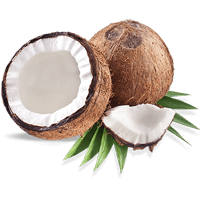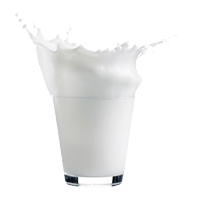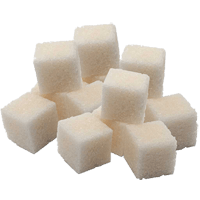Coconut milk nutrition: calories, carbs, GI, protein, fiber, fats
Nuts, coconut milk, raw (liquid expressed from grated meat and water)
*all the values are displayed for the amount of 100 grams
Top nutrition facts for Coconut milk
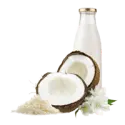
| Calories ⓘ Calories for selected serving | 230 kcal |
|
Glycemic index ⓘ
Source: Check out our full article on Coconut milk glycemic index Check out our Glycemic index chart page for the full list.
|
97 (high) |
| Net Carbs ⓘ Net Carbs = Total Carbohydrates – Fiber – Sugar Alcohols | 3 grams |
| Default serving size ⓘ Serving sizes are mostly taken from FDA's Reference Amounts Customarily Consumed (RACCs) | 1 tbsp (15 grams) |
| Acidity (Based on PRAL) ⓘ PRAL (Potential renal acid load) is calculated using a formula. On the PRAL scale the higher the positive value, the more is the acidifying effect on the body. The lower the negative value, the higher the alkalinity of the food. 0 is neutral. | -1.9 (alkaline) |
| Oxalates ⓘ https://www.ncbi.nlm.nih.gov/pmc/articles/PMC8611107/ | 0 mg |
Coconut milk calories (kcal)
| Calories for different serving sizes of coconut milk | Calories | Weight |
|---|---|---|
| Calories in 100 grams | 230 | |
| Calories in 1 tbsp | 35 | 15 g |
| Calories in 1 cup | 552 | 240 g |
| Calories for different varieties of coconut milk | Calories | Weight |
|---|---|---|
| Nuts, coconut milk, raw (liquid expressed from grated meat and water) (this food) | 230 | 100 g |
| Nuts, coconut water (liquid from coconuts) | 19 | 100 g |
| Nuts, ginkgo nuts, canned | 111 | 100 g |
| Nuts, coconut milk, canned (liquid expressed from grated meat and water) | 197 | 100 g |
| Nuts, coconut milk, frozen (liquid expressed from grated meat and water) | 202 | 100 g |
| Nuts, ginkgo nuts, dried | 348 | 100 g |
| Nuts, formulated, wheat-based, unflavored, with salt added | 622 | 100 g |
| Nuts, formulated, wheat-based, all flavors except macadamia, without salt | 647 | 100 g |
Coconut milk Glycemic index (GI)
Source:
Check out our full article on Coconut milk glycemic index
Check out our Glycemic index chart page for the full list.
Mineral coverage chart
Mineral chart - relative view
Vitamin coverage chart
Vitamin A:
0µg of 900µg
0%
Vitamin E:
0.45mg of 15mg
3%
Vitamin D:
0µg of 20µg
0%
Vitamin C:
8.4mg of 90mg
9.3%
Vitamin B1:
0.08mg of 1mg
6.5%
Vitamin B2:
0mg of 1mg
0%
Vitamin B3:
2.3mg of 16mg
14%
Vitamin B5:
0.55mg of 5mg
11%
Vitamin B6:
0.1mg of 1mg
7.6%
Folate:
48µg of 400µg
12%
Vitamin B12:
0µg of 2µg
0%
Vitamin K:
0.3µg of 120µg
0.25%
Vitamin chart - relative view
Macronutrients chart
Protein:
Daily Value: 5%
2.3 g of 50 g
2.3 g (5% of DV )
Fats:
Daily Value: 37%
23.8 g of 65 g
23.8 g (37% of DV )
Carbs:
Daily Value: 2%
5.5 g of 300 g
5.5 g (2% of DV )
Water:
Daily Value: 3%
67.6 g of 2,000 g
67.6 g (3% of DV )
Other:
0.7 g
0.7 g
Protein quality breakdown
Tryptophan:
81mg of 280mg
29%
Threonine:
249mg of 1,050mg
24%
Isoleucine:
270mg of 1,400mg
19%
Leucine:
510mg of 2,730mg
19%
Lysine:
303mg of 2,100mg
14%
Methionine:
129mg of 1,050mg
12%
Phenylalanine:
348mg of 1,750mg
20%
Valine:
417mg of 1,820mg
23%
Histidine:
159mg of 700mg
23%
Fat type information
Saturated fat:
21 g
Monounsaturated fat:
1 g
Polyunsaturated fat:
0.26 g
Fiber content ratio for Coconut milk
Sugar:
3.3 g
Fiber:
2.2 g
Other:
0 g
All nutrients for Coconut milk per 100g
| Nutrient | Value | DV% | In TOP % of foods | Comparison |
| Vitamin A | 0µg | 0% | 100% | |
| Calories | 230kcal | 12% | 42% |
4.9 times more than Orange
|
| Protein | 2.3g | 5% | 76% |
1.2 times less than Broccoli
|
| Fats | 24g | 37% | 11% |
1.4 times less than Cheese
|
| Vitamin C | 2.8mg | 3% | 34% |
18.9 times less than Lemon
|
| Carbs | 5.5g | 2% | 59% |
5.1 times less than Rice
|
| Net carbs | 3.3g | N/A | 62% |
16.2 times less than Chocolate
|
| Cholesterol | 0mg | 0% | 100% |
N/A
|
| Vitamin D | 0µg | 0% | 100% |
N/A
|
| Magnesium | 37mg | 9% | 27% |
3.8 times less than Almonds
|
| Calcium | 16mg | 2% | 61% |
7.8 times less than Milk
|
| Potassium | 263mg | 8% | 45% |
1.8 times more than Cucumber
|
| Iron | 1.6mg | 21% | 45% |
1.6 times less than Beef broiled
|
| Sugar | 3.3g | N/A | 53% |
2.7 times less than Coca-Cola
|
| Fiber | 2.2g | 9% | 35% |
1.1 times less than Orange
|
| Copper | 0.27mg | 30% | 26% |
1.9 times more than Shiitake
|
| Zinc | 0.67mg | 6% | 62% |
9.4 times less than Beef broiled
|
| Phosphorus | 100mg | 14% | 64% |
1.8 times less than Chicken meat
|
| Sodium | 15mg | 1% | 83% |
32.7 times less than White bread
|
| Vitamin E | 0.15mg | 1% | 81% |
9.7 times less than Kiwi
|
| Selenium | 6.2µg | 11% | 65% | |
| Manganese | 0.92mg | 40% | 33% | |
| Vitamin B1 | 0.03mg | 2% | 84% |
10.2 times less than Pea raw
|
| Vitamin B2 | 0mg | 0% | 100% |
N/A
|
| Vitamin B3 | 0.76mg | 5% | 72% |
12.6 times less than Turkey meat
|
| Vitamin B5 | 0.18mg | 4% | 82% |
6.2 times less than Sunflower seeds
|
| Vitamin B6 | 0.03mg | 3% | 86% |
3.6 times less than Oats
|
| Vitamin B12 | 0µg | 0% | 100% |
N/A
|
| Vitamin K | 0.1µg | 0% | 88% |
1016 times less than Broccoli
|
| Folate | 16µg | 4% | 52% |
3.8 times less than Brussels sprouts
|
| Saturated fat | 21g | 106% | 6% |
3.6 times more than Beef broiled
|
| Choline | 8.5mg | 2% | 87% | |
| Monounsaturated fat | 1g | N/A | 64% |
9.7 times less than Avocado
|
| Polyunsaturated fat | 0.26g | N/A | 74% |
180.7 times less than Walnut
|
| Tryptophan | 0.03mg | 0% | 91% |
11.3 times less than Chicken meat
|
| Threonine | 0.08mg | 0% | 91% |
8.7 times less than Beef broiled
|
| Isoleucine | 0.09mg | 0% | 91% |
10.2 times less than Salmon raw
|
| Leucine | 0.17mg | 0% | 90% |
14.3 times less than Tuna Bluefin
|
| Lysine | 0.1mg | 0% | 91% |
4.5 times less than Tofu
|
| Methionine | 0.04mg | 0% | 89% |
2.2 times less than Quinoa
|
| Phenylalanine | 0.12mg | 0% | 90% |
5.8 times less than Egg
|
| Valine | 0.14mg | 0% | 90% |
14.6 times less than Soybean raw
|
| Histidine | 0.05mg | 0% | 90% |
14.1 times less than Turkey meat
|
| Caffeine | 0mg | 0% | 100% | |
| Omega-3 - EPA | 0g | N/A | 100% |
N/A
|
| Omega-3 - DHA | 0g | N/A | 100% |
N/A
|
| Omega-3 - DPA | 0g | N/A | 100% |
N/A
|
Check out similar food or compare with current
NUTRITION FACTS LABEL
Nutrition Facts
___servings per container
Serving Size ______________
Serving Size ______________
Amount Per 100g
Calories 230
% Daily Value*
37%
Total Fat
24g
96%
Saturated Fat 21g
0
Trans Fat
0g
0
Cholesterol 0mg
0.65%
Sodium 15mg
1.8%
Total Carbohydrate
5.5g
8.8%
Dietary Fiber
2.2g
Total Sugars 0g
Includes ? g Added Sugars
Protein
2.3g
Vitamin D
0mcg
0
Calcium
16mg
1.6%
Iron
1.6mg
21%
Potassium
263mg
7.7%
*
The % Daily Value (DV) tells you how much a nutrient in a serving of food contributes to a daily diet. 2,000 calories a day is used for general nutrition advice.
Health checks
ⓘ
Dietary cholesterol is not associated with an increased risk of coronary heart disease in healthy individuals. However, dietary cholesterol is common in foods that are high in harmful saturated fats.
Source
Low in Cholesterol
ⓘ
Trans fat consumption increases the risk of cardiovascular disease and mortality by negatively affecting blood lipid levels.
Source
No Trans Fats
ⓘ
Saturated fat intake can raise total cholesterol and LDL (low-density lipoprotein) levels, leading to an increased risk of atherosclerosis. Dietary guidelines recommend limiting saturated fats to under 10% of calories a day.
Source
Low in Saturated Fats
ⓘ
While the consumption of moderate amounts of added sugars is not detrimental to health, an excessive intake can increase the risk of obesity, and therefore, diabetes.
Source
Low in Sugars
Coconut milk nutrition infographic
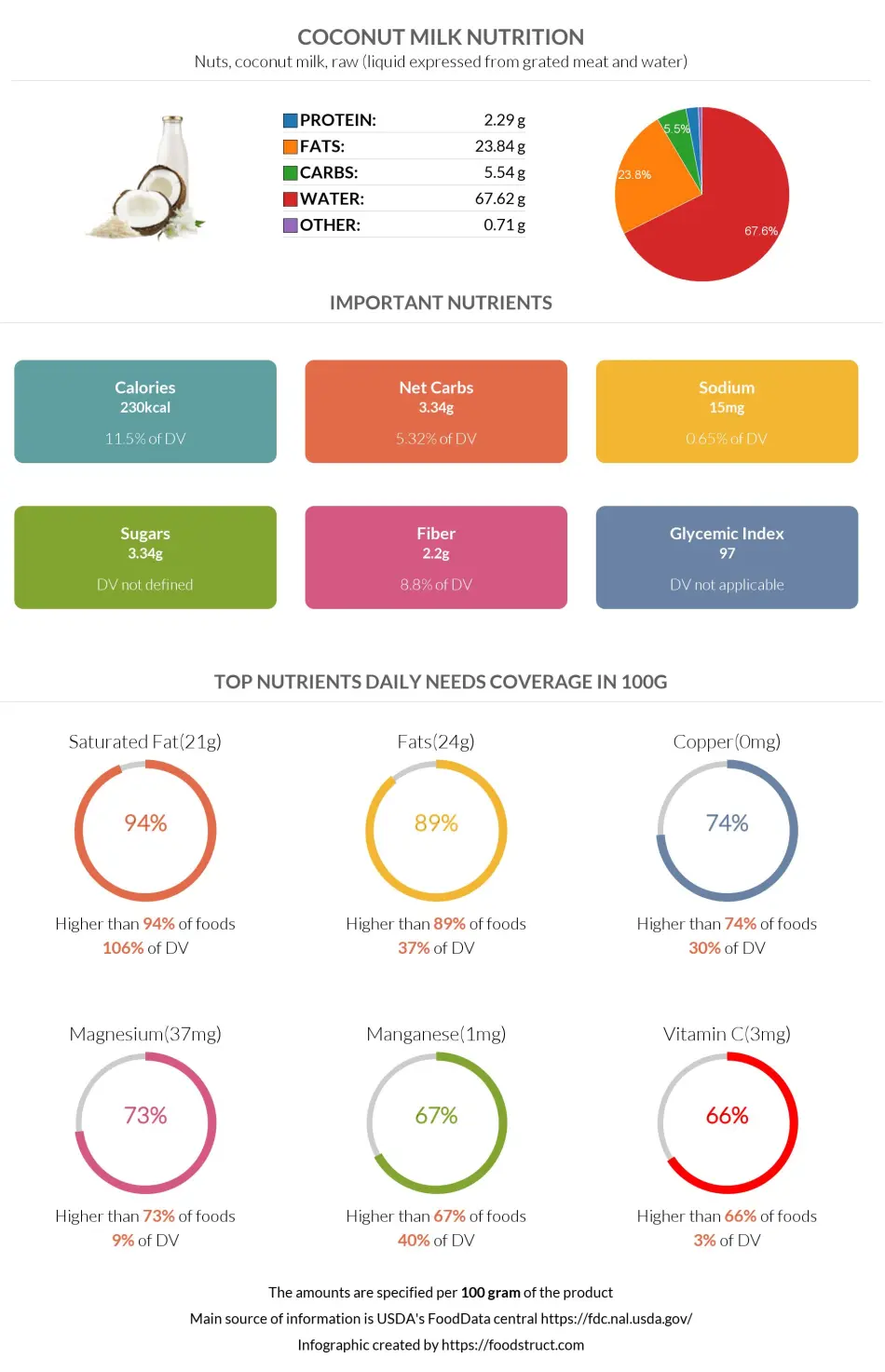
Infographic link
References
All the values for which the sources are not specified explicitly are taken from FDA’s Food Central. The exact link to the food presented on this page can be found below.
